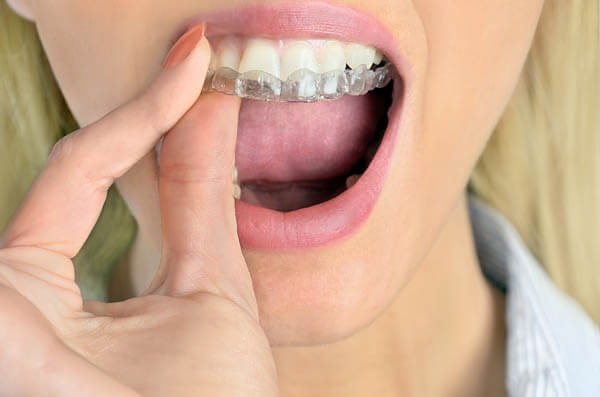Night guards—you’ve probably heard of them and maybe even seen an over-the-counter model at the pharmacy. But do you need one? The short answer is yes if your dentist has already recommended one. If not, it’s a bit more of a gray area, one that you should talk to your dentist about before making a final decision.
Why do people wear night guards?
Night guards can help with a number of issues, with the two most common being teeth grinding and teeth clenching.
Teeth Grinding
Teeth grinding is when the jaw is moved back and forth during sleep. The friction and pressure of grinding can eventually damage the enamel and structure of the teeth. Over time, the damage can contribute to tooth sensitivity and decay.
Teeth Clenching
Teeth clenching is similar to teeth grinding but a little different. Rather than moving the teeth back and forth, teeth clenching involves pressing the teeth together tightly and holding them there. It, too, can damage the surface of the teeth and cause jaw pain.
Teeth grinding and clenching are both types of a condition called bruxism. Many people aren’t even aware they have bruxism. Instead, they notice symptoms like:
- Jaw pain
- Headaches
- Tooth sensitivity
- Tired jaw muscles
- Neck or face pain
- Pain radiating into the ears
- Sleep problems
What do night guards do?
In short, night guards protect your teeth from yourself. They come between the upper and lower jaw, separating and cushioning the teeth to prevent damage.
Night guards can also add vital protection for dental implants. Excess movement and pressure are often a cause of dental implant failure, especially early in the implant process. A night guard can help stabilize and preserve the dental implant and surrounding tissue.
Night guards come in several types, including over-the-counter (OTC) and prescription. Don’t worry if you’re not sure which type you need. If your dentist recommends a night guard, they will probably recommend the right type, too.
The most common types include:
- Stock mouth (OTC): Stock mouthguards are the most affordable but offer zero customization. They’re a one-size-fits-all type of solution that’s not designed for long-term relief.
- Boil-and-bite (OTC): These moldable models are boiled to soften the materials and then bitten into to fit them to the teeth. They’re more custom than a stock mouth design but nowhere near as comfortable or effective as a professional mouthguard.
- Soft (Professional): Dentists frequently prescribe this thin, flexible type of night guard. These models involve the dentist taking impressions and measurements then sending them to a lab that manufactures the night guard. They’re a comfortable BPA-free solution that’s used for mild cases of bruxism.
- Dual laminate (Professional): More severe bruxism cases may need a dual laminate or bilaminar night guard. These guards have a hard outside with a soft inside. They act more like a splint than a guard and work well for grinding.
- Hard acrylic (Professional): This is another option for severe cases of bruxism. These hard acrylic night guards can realign the jaw to relieve TMJ disorders.
Your dentist will choose a night guard type based on your dental health and needs.
Do you need a night guard?
If a dentist says you need a night guard, you do. Without a night guard, you risk damage to your teeth, crowns, dental implants, restorations, and jaw.
Grinding and clenching that continues long-term can lead to tension headaches and severe jaw and facial pain. They can also contribute to disorders of the temporomandibular joints (TMJs). These joints, located in front of the ears, may click or shift when you open or close your mouth.
Protect Your Teeth and Implants
Teeth need regular, gentle care, and treatment for teeth grinding and clenching is part of that care. If you have dental implants, you may need professional help to protect them from the symptoms of bruxism.
At Good Samaritan Dental Institute, we specialize in caring for dental implants. Call 561-883-6880 to schedule a consultation if you are experiencing the symptoms of bruxism. Dr. Slavin and his team can help develop a customized treatment plan. Your teeth (and dental implants) should last a lifetime, and we’re here to make sure they do.

